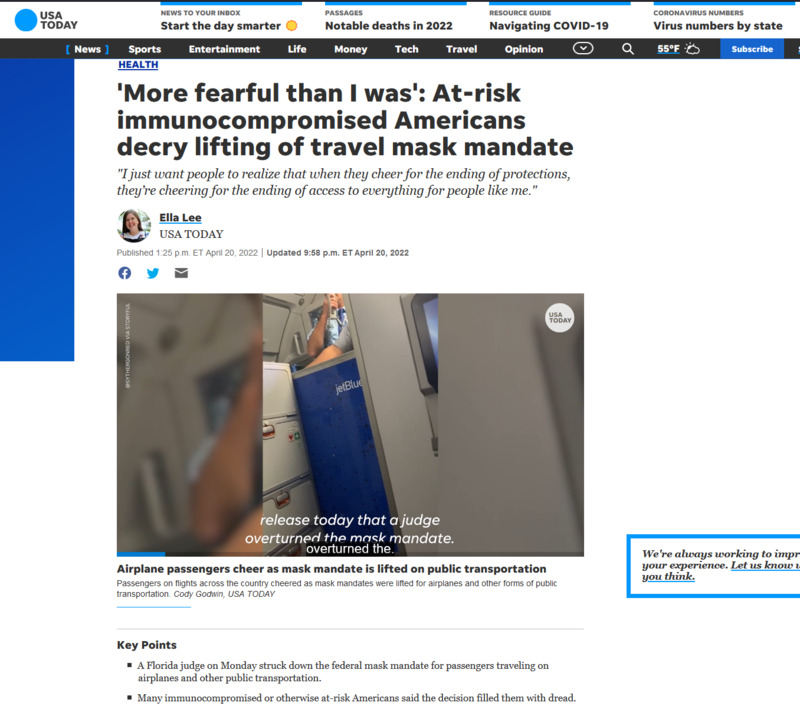Item
'More fearful than I was': At-risk immunocompromised Americans decry lifting of travel mask mandate
Title (Dublin Core)
'More fearful than I was': At-risk immunocompromised Americans decry lifting of travel mask mandate
Description (Dublin Core)
This is a news story from USA Today by Ella Lee. This is about pushback against the lifting of the mask mandate, as it has made immunocompromised people afraid.
"Being immunocompromised, it's already a huge risk getting on a plane with everybody masked," said Derek Schmitz, 17, of Oxford, Alabama, who takes immune-suppressing arthritis medication and has to fly for work as a disability advocate. "Now, knowing that I most likely will be one of the only people on a plane with a mask is petrifying."
After the lift of the mandate for planes and other public transportation was voided, ride share companies like Uber and Lyft have followed suit in removing their own mandates.
"I was angry and felt hopeless," said Erin Masengale, 33, who has multiple autoimmune diseases treated by immunosuppressants. "I just want people to realize that when they cheer for the ending of protections, they’re cheering for the ending of access to everything for people like me."
Under the strict definition of immunocompromised, only about 3% of Americans fit that definition. Though, the author mentions that disabled and chronically ill people, a much larger population, also face risk with the lifted mandates.
The question I have for people that read this is: is it worth it to keep the mandate even though it caters to a relatively small population? Would it be wiser for people already with these ailments to mask on their own instead of mandating it for everyone else, especially if overall cases and hospitalizations are lower? These are the questions I have after reading this article. I am not against people masking when they see fit, but it is clear that these mandates have worn many people out.
"Being immunocompromised, it's already a huge risk getting on a plane with everybody masked," said Derek Schmitz, 17, of Oxford, Alabama, who takes immune-suppressing arthritis medication and has to fly for work as a disability advocate. "Now, knowing that I most likely will be one of the only people on a plane with a mask is petrifying."
After the lift of the mandate for planes and other public transportation was voided, ride share companies like Uber and Lyft have followed suit in removing their own mandates.
"I was angry and felt hopeless," said Erin Masengale, 33, who has multiple autoimmune diseases treated by immunosuppressants. "I just want people to realize that when they cheer for the ending of protections, they’re cheering for the ending of access to everything for people like me."
Under the strict definition of immunocompromised, only about 3% of Americans fit that definition. Though, the author mentions that disabled and chronically ill people, a much larger population, also face risk with the lifted mandates.
The question I have for people that read this is: is it worth it to keep the mandate even though it caters to a relatively small population? Would it be wiser for people already with these ailments to mask on their own instead of mandating it for everyone else, especially if overall cases and hospitalizations are lower? These are the questions I have after reading this article. I am not against people masking when they see fit, but it is clear that these mandates have worn many people out.
Date (Dublin Core)
Creator (Dublin Core)
Event Identifier (Dublin Core)
HST580
Partner (Dublin Core)
Type (Dublin Core)
Text story
Link (Bibliographic Ontology)
Publisher (Dublin Core)
USA Today
Controlled Vocabulary (Dublin Core)
Contributor's Tags (a true folksonomy) (Friend of a Friend)
immunocompromised
disability
chronic illness
mask
mask mandate
travel
public transportation
federal government
Uber
Lyft
Collection (Dublin Core)
Linked Data (Dublin Core)
Date Submitted (Dublin Core)
4/20/2022
Date Modified (Dublin Core)
04/22/2022
09/25/2022
08/02/2022
Date Created (Dublin Core)
04/20/2022
Item sets
This item was submitted on April 20, 2022 by [anonymous user] using the form “Share Your Story” on the site “A Journal of the Plague Year”: https://covid-19archive.org/s/archive
Click here to view the collected data.

